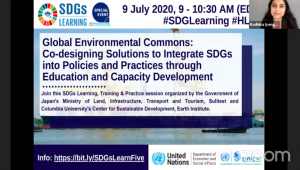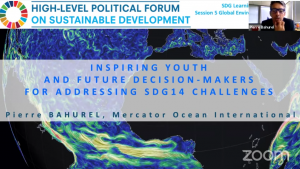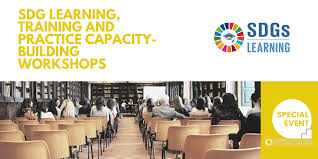 As part of the Copernicus Marine Service, Mercator Ocean international (MOi), has launched a partnership with the organization Sulitest to co-produce a Sustainable Development Goal (SDG) 14 pedagogical module with the UN Department of Economic and Social Affairs (UN DESA). This initiative was announced by the MOi Director General and the Sulitest Secretary General during the SDG Learning and Training 2020 weblive session on July 9th. The event was part of the Global Environmental Commons and held through the UN High-level Political Forum on Sustainable Development (HLPF).
As part of the Copernicus Marine Service, Mercator Ocean international (MOi), has launched a partnership with the organization Sulitest to co-produce a Sustainable Development Goal (SDG) 14 pedagogical module with the UN Department of Economic and Social Affairs (UN DESA). This initiative was announced by the MOi Director General and the Sulitest Secretary General during the SDG Learning and Training 2020 weblive session on July 9th. The event was part of the Global Environmental Commons and held through the UN High-level Political Forum on Sustainable Development (HLPF).
The UN DESA pilots the United Nation SDGs and makes science literacy a top priority. Sulitest, works to raise awareness amongst the general public, in particular youth—our future leaders. They also aim to measure the uptake of sustainable literacy. They have created 3 SDG educational modules thus far that cover energy and the circular economy, for example. Some 155,228 young people have passed these modules.
The SDG 14 module developed by MOi on behalf of the EU and in partnership with Sulitest will include a list of nearly 30 questions in 10 languages concerning key mechanisms of and challenges facing the ocean. For example, it will highlight ocean acidification, for which the Copernicus Marine Service has developed a suite of datasets and indicators (including contributions to EUROSTAT/EEA in support of SDG 14). The MOi team dedicated to the project includes: Elodie Gutknecht, Coralie Perruche, Fabrice Messal and Cecile Thomas-Courcoux. They will build and work with a multi-stakeholder working group (researchers, practitioners and experts, policy- and decision-makers) to conceive a sound MCQ Module meant for the general public, combining ocean policy and ocean literacy. The finalised module will be presented at the next UN Ocean Conference in Lisbon in 2021.
The virtual event kicking off the production of these SDG modules was entitled, “Global Environmental Commons: Co-designing solutions to integrate SDGs into policies and practices through education and capacity development”. Partner organizations of the event included the Ministry of Land, Infrastructure, Transport and Tourism (MLIT), of the Government of Japan, Sulitest, and the Center for Sustainable Development, Earth Institute, of Columbia University. The session was attended by over 2,500 attendees.
The event featured distinguished ocean and environmental leaders addressing the issue of integration of SDGs in policy and practices. Jeffrey Sachs, world-renowned economist and Professor at Columbia University, gave open remarks. “If we are really going to co-design solutions, we have to keep our eye rigorously on the targets,” he said in reference to the SDGs and the 2030 Agenda. The European Union was well represented with notable presenters, Virginijus Sinkevičius, European Commissioner for Environment, Oceans and Fisheries, and Member of the European Parliament (MEP) Catherine Chabaud. Both underlined that the European Union’s commitment to the 2030 Agenda on Sustainable Development and specifically highlighted actions on SDG 14. Commissioner Sinkevičius emphasised, “We need to have the courage to listen to science…and it’s time to act”, while MEP Chaubad discussed the ocean as a common commodity, saying “the reality is that SDG14 is interconnected with all the other SDGs”.
 Pierre Bahurel, Director General of MOi, presented on the need to strengthen the policy-business-science nexus to implement SDG 14 and to foster the sustainable use of marine resources. He also discussed the EU vision to expand and proliferate open ocean data, which empowers policy-makers to implement and track achievements of SDG14 targets, as well as to educate the leaders of tomorrow. “We have created a digital ocean,” Bahurel explains. It measures the ocean’s health and state across Blue (physical), Green (biogeochemical), and White (sea ice) indicators. “You can play and interact with this digital ocean,” he demonstrated with data animations of sea level and sea ice—bringing to life the often unseen mechanisms of the ocean. “I’m enthusiastic about the Sulitest [SDG 14] module” he expounded. He adds that it is a great ocean literacy opportunity for the Copernicus Marine Service and MOi to give decision-makers and young people alike the information they need to steer our collective decisions to use and co-exist with the ocean responsibly.
Pierre Bahurel, Director General of MOi, presented on the need to strengthen the policy-business-science nexus to implement SDG 14 and to foster the sustainable use of marine resources. He also discussed the EU vision to expand and proliferate open ocean data, which empowers policy-makers to implement and track achievements of SDG14 targets, as well as to educate the leaders of tomorrow. “We have created a digital ocean,” Bahurel explains. It measures the ocean’s health and state across Blue (physical), Green (biogeochemical), and White (sea ice) indicators. “You can play and interact with this digital ocean,” he demonstrated with data animations of sea level and sea ice—bringing to life the often unseen mechanisms of the ocean. “I’m enthusiastic about the Sulitest [SDG 14] module” he expounded. He adds that it is a great ocean literacy opportunity for the Copernicus Marine Service and MOi to give decision-makers and young people alike the information they need to steer our collective decisions to use and co-exist with the ocean responsibly.
> Click here to watch MOi Director General, Pierre Bahurel’s, presentation (at 39:00 mark)
> Click here to see the full recorded event here
> Click here to learn more about the event

